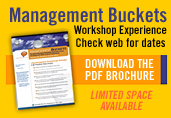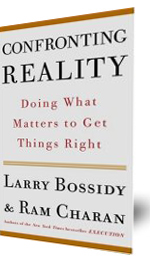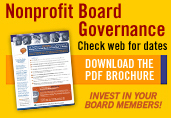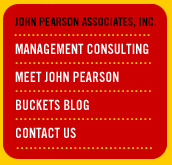
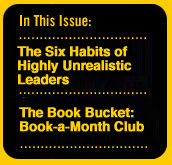
Issue No. 57 of Your Weekly Staff Meeting asks, “How can you anticipate change before it’s too late?” The authors of this week’s book reference hockey great Wayne Gretsky’s famous answer, “A good hockey player plays where the puck is. A great hockey player plays where the puck is going to be.” And this reminder: reviews of more than 50 books are featured on my Buckets Blog.
“Avoiding reality is a basic and ubiquitous human tendency,” write Larry Bossidy and Ram Charan. Leaders often tilt that way also and lack the discipline to confront reality. They comment, “Exercising the power of realism requires an open and inquisitive mind, intense curiosity, the intellectual ability to sort out complexity, the ability to persuade others, and—undergirding it all—the courage of inner strength. People who lack these qualities can’t be considered leaders. They should look for other work.” Yikes!
This is no quick-read novelette with three points and a poem. It’s a thinking person’s serious book with an innovative business model as the reward for your reading diligence. When programs, products and services all start to look alike (cell phones, music, churches, hamburgers, conferences, airlines, eNewsletters, etc.) the authors quote IBM’s CEO with this warning, “Either you innovate or you’re in commodity hell.”
Why do leaders fail to confront reality and change? There are six habits of highly unrealistic leaders, suggest Bossidy and Charan: 1) Filtered information, 2) Selective hearing, 3) Wishful thinking, 4) Fear, 5) Emotional overinvestment and 6) Unrealistic expectations of capital markets.
Click here to order from Amazon: Confronting Reality: Doing What Matters to Get Things Done. It’s the follow-up to their best seller, Execution: The Discipline of Getting Things Done (See Issue No. 29).
Your Weekly Staff Meeting Questions:
---------------------------------------------------------------------------------------------------
1. Which one of the six habits of highly unrealistic leaders could be the downfall of our organization?
2. What are we doing—diligently—to confront reality so our organization isn’t left in the dust by our more innovative “competitors?”
---------------------------------------------------------------------------------------------------
Insights from the Management Buckets Workshop Experience
Herb Pfiffner, the executive director of Seattle’s Union Gospel Mission, hosts a monthly meeting with his department directors. Each meeting features a management or leadership book review presented by a team member. After discussion, the book goes in the resource library so all staff members have access to it for their professional growth.
Remind your people that most books need not be read from beginning to end. Highlight chapters that address key management topics, such as Chapter 9 in The Organized Executive by Stephanie Winston. (See Issue No. 40.) The 25 pages in “Time Evaluation: From Objective to Reality” includes an eight-step process for measuring and mastering your day-to-day routine.

Your Weekly Staff Meeting Questions:
---------------------------------------------------------------------------------------------------
1. What’s the best leadership or management book you have read recently?
2. What are five to 10 obstacles that most new employees face—and what chapters in what books address these issues?
---------------------------------------------------------------------------------------------------
Do you need a kick-in-the-Hoopla-pants? I can help. Email me atJohn@JohnPearsonAssociates.com.
The Book Bucket is just one of 20 buckets that every organization must master. Join us at the next two-day Management Buckets Workshop Experience, Oct. 31 and Nov. 1, 2007, in Orange County, Calif. The next Nonprofit Board Governance Workshopwill be Nov. 2 (Orange County, Calif.). Registration forms are posted at www.JohnPearsonAssociates.com. .
Download the Management Buckets brochure
PS. Click “Forward Email” below to recommend this free eNews to a colleague.
